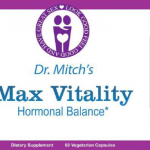There is lots of confusion about testosterone. Let us look at some of the misconceptions so that you can understand the role of testosterone role for both men and women.
Men’s testosterone levels peak in their early twenties. Most laboratories consider normal range for total testosterone between 200-1100 ng/dL. That is a wide range and men can experience symptoms if their testosterone is not close to the upper limits of the range. The symptoms include fatigue and low energy, difficulty concentrating, low libido and erectile dysfunction.
Testosterone levels are affected by many factors and a thorough work up is necessary to identify the cause. Some of the common causes include stress, lack of physical activity, obesity, diabetes, autoimmune disease. In addition, excessive testosterone conversion to estrogen can also cause low testosterone levels, yet many healthcare providers do not look at estrogen levels in a male.
The most common form of testosterone replacement is by intramuscular injection. This approach poses several issues and health risks. First it is impossible to achieve a steady stable level, therefore man will waver between feeling great when the testosterone peaks and then have a radical return to their symptoms as it wears off. Next, there is increased risk of excessive aromatization-a chemical pathway in our bodies that causes estrogen to rise to potentially dangerous levels. In addition, injectable form of testosterone might be irritating to the liver with long-term use.
The confusion about testosterone in females might be even worse. In my practice I have, on more than one occasion encountered women that were not even aware that they too have testosterone and when the level drops, their sense of wellbeing might be negatively affected.
The conventional medical community might be partially to blame for this confusion because some family physicians or gynecologists don’t assay for testosterone levels in a female or if they do order the test, they do not offer appropriate guidance for treatment. I witnessed this firsthand when I was doing my OB/GYN rotation; the physicians would refuse to consider hormone replacement with maybe the exception of synthetic estrogen, basically dismissing peri-menopausal and menopausal symptoms as “normal part of aging”.
What are the symptoms for women? Low testosterone might be responsible for poor libido, difficulty achieving orgasm, low energy, muscle weakness, and memory issues just to name a few. If you experience any of these symptoms, you should discuss them with your primary care provider or gynecologist. If they do not order the appropriate lab tests, you might need to look for an anti-aging practitioner, who is experienced with hormone testing and replacement.
Read more:
Positive Cardiovascular Effects of Testosterone
https://academic.oup.com/eurheartj/article-abstract/36/40/2706/2293361?redirectedFrom=fulltext
Bone Health & Testosterone
https://www.ncbi.nlm.nih.gov/pubmed/10995046/
Improved Body Composition – Muscle Mass, Strength, Fat
Related Products





